#lise khokhlakova
Explore tagged Tumblr posts
Text
Lise Khokhlakova

60 notes
·
View notes
Text
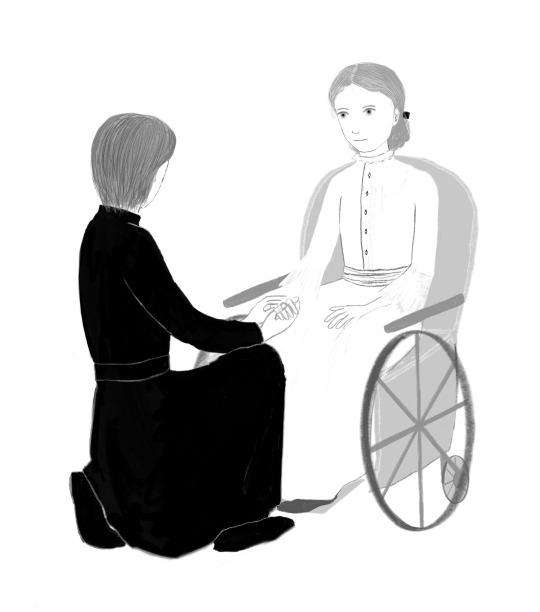
Alyosha & Lisé
#alyosha karamazov#lise khokhlakova#the brothers karamazov#fyodor dostoevsky#ruslit#fanart#достоевский
25 notes
·
View notes
Text

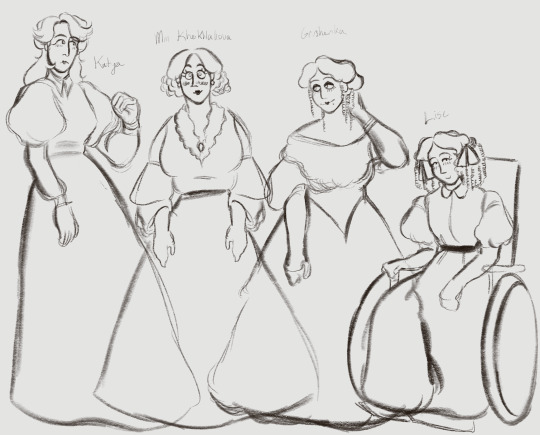
various tbk girls (and aglaya hehe)
#the brothers karamazov#the karamazov brothers#tbk#Братья Карамазовы#dostoyevsky#dostoevsky#fyodor dostoyevsky#fyodor dostoevsky#fyodor mikhailovich dostoevsky#Достоевский#grushenka#agrafena alexandrovna svetlova#katerina ivanovna verkhovtseva#katya verkhovtseva#katya#lise#lise khokhlakova#madame khokhlakova#mme khokhlakova#katerina osipovna khokhlakova#aglaya ivanovna#aglaya ivanovna epanchina#aglaya epanchina#aglaya#my art#q#lee.txt
47 notes
·
View notes
Text
(Last reblog) And about that. I loved almost every female character in TBK but my love for Katerina turned into irritation quickly after the trial. She's very real, I give her that, and I kinda kin her but noooo. Why would she do that :(
And also I don't think she'd be happy with either Ivan or Dmitri really. It would be extremely interesting to read the next book about her and Ivan but I'm not a fan of them together.
The couple dynamic I do like though is Alyosha and Lise. The fact that they are not together at the end seems good too but moments when they were are dear to me.
I didn't get was it really a love letter that she told Alyosha to give to Ivan but I can see why it happened and it happened so naturally and I love Alyosha's reactions and how he's not jealous or angry with her even when she says wild things.
#lise khokhlakova#lisa khokhlakova#alyosha karamazov#katerina ivanovna verkhovtseva#ivan karamazov#tbk#female characters#love them
8 notes
·
View notes
Text
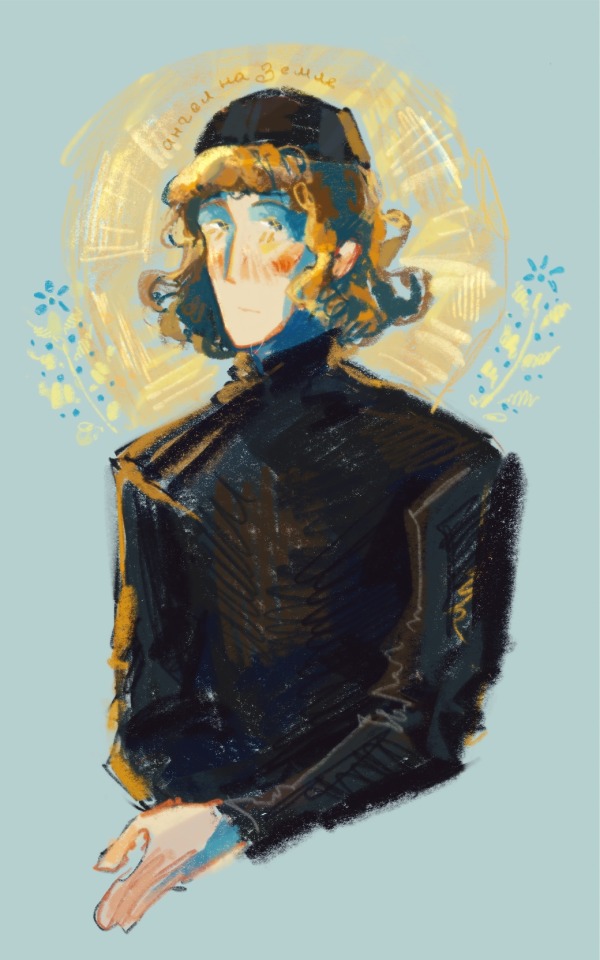

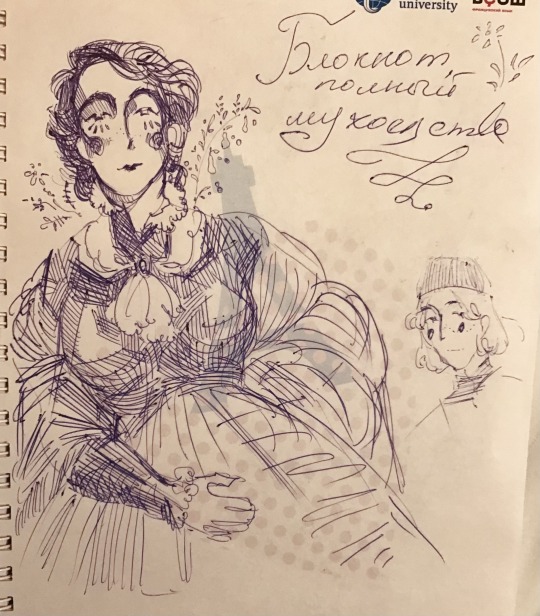
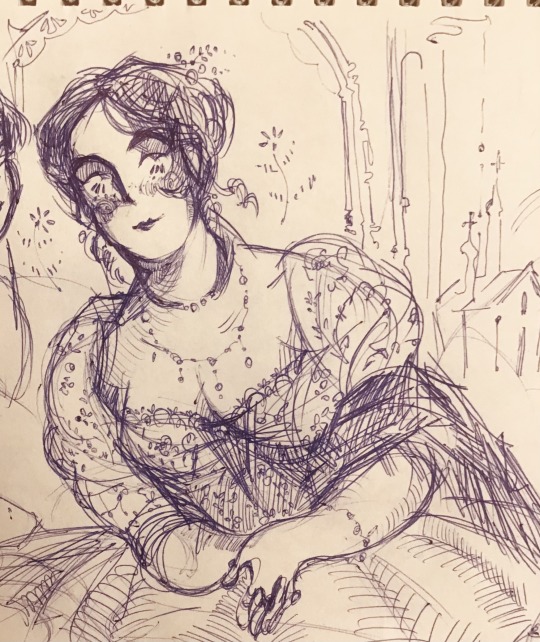
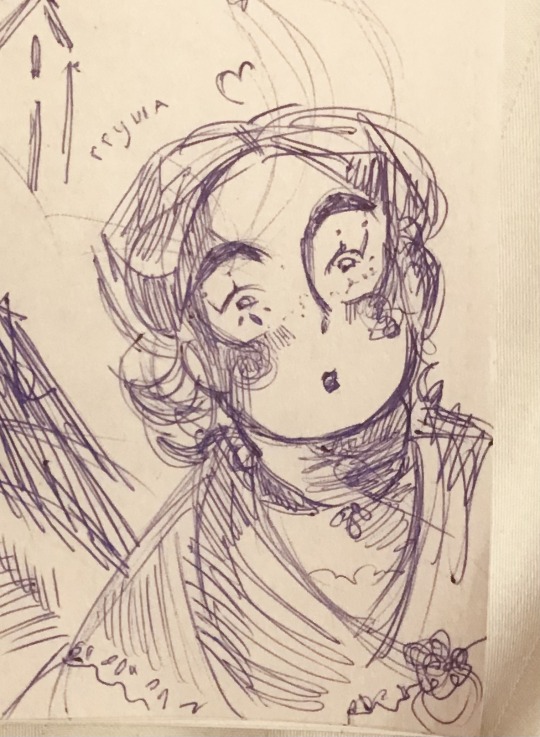
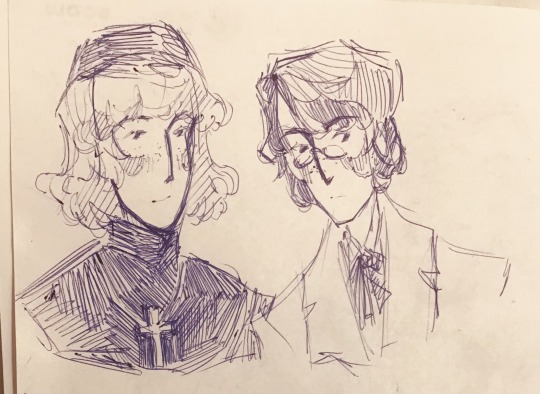
I STARTED READING THE BROTHERS KARAMAZOV LETS GOOOO
#the brothers karamazov#russian literature#ruslit#dostoyevski#alyosha karamazov#alexei karamazov#ivan karamazov#lise khokhlakova#grushenka#grusha grusha grusha#i love drawing her#i also like that she is fat AND everyone thinks shes pretty#aaaand she looks exactly like me i wanna cosplay her#rknchan art
158 notes
·
View notes
Text
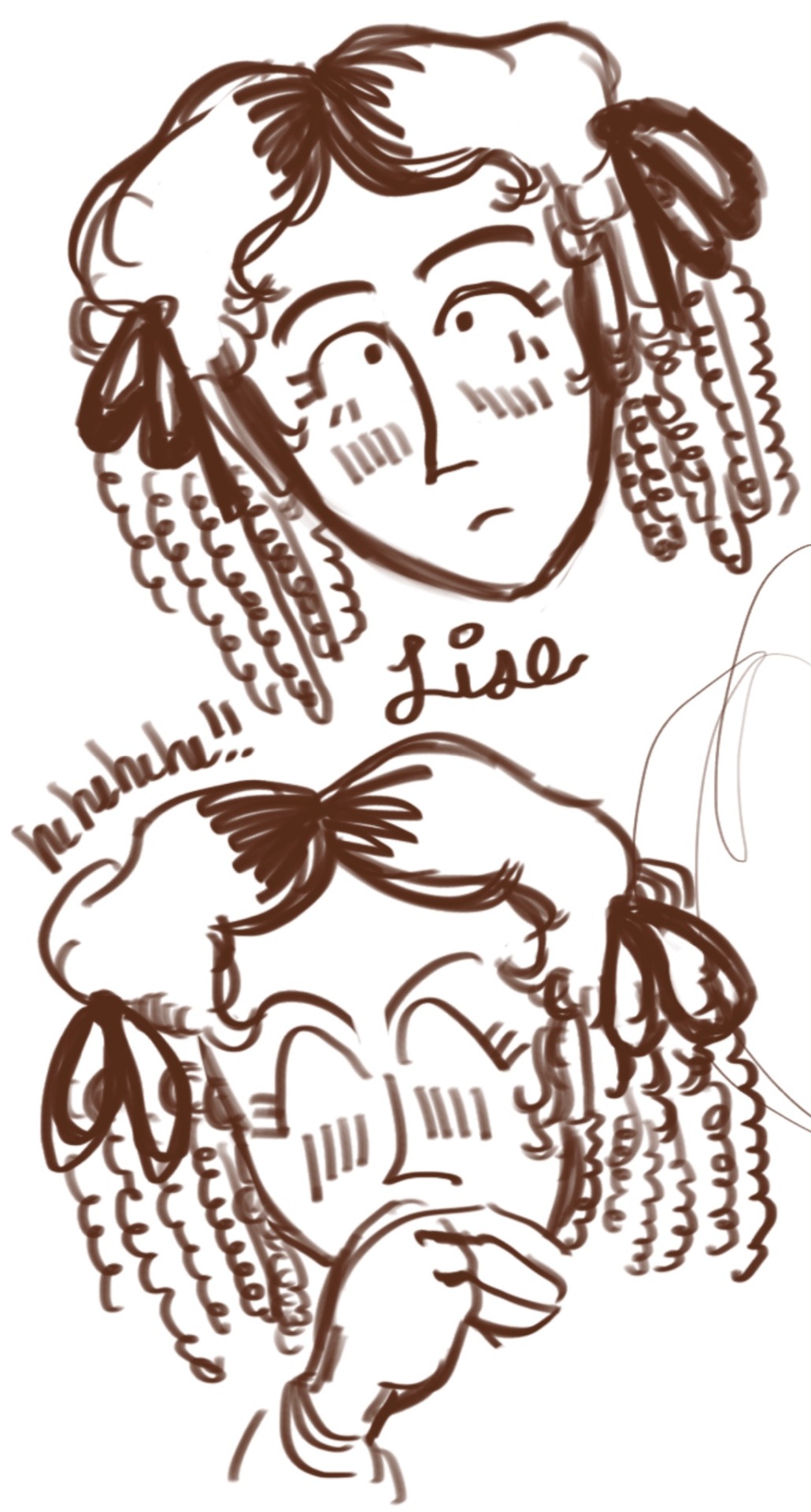
lise!!!!!!!
#lise khokhlakova#karamazov#khokhlakova#brothers karamazov#the brothers karamazov#the karamazov brothers#tbk#my art#fanart#art#lit#lee's art
56 notes
·
View notes
Text
2.4 A Lady of Little Faith
What does the possibility of nothingness mean for us? Why do we love, and can we love purely for the sake of it? Madame Khokhlakova was fine until she started thinking about it. These sort of questions plague her and make her suffer from her "little faith". She claims nobody else is thinking about it, but in reality, she has spoken for many by daring to make these questions, even if they might make her look foolish or selfish in front of others.
Once someone asked me: "Why try at all if it all ends? What do you think?" and my answer was: "Precisely because it all ends. It's the same for everybody, and we already have it hard as it is. You might as well make things nicer on the way there." Intuitively, Zosima's words of "active love" to Madame K. seemed to mean something of that sort in my eyes. Death for a great idea has been looked upon as commitment to a greater good, but can you live for your "good"? In death, "you" become lasting and static, like your idea. The death you have to accept for yourself may be found in life —in the sense that when you live seriously, you may have to do away with ideas you had of yourself or what is right until the end, you have to kill your fantastic selves. It's tedious, just like most pain around us. Dreams protect us from it like armour, but truly loving entails summoning your courage against shame and disdain in those little moments.
Zosima has a positive outlook on humanity alongside his notion of what it is to be a responsible human being. Man was made to be happy, so one becomes more human by active love. Paradoxically, such advice offered to someone struggling with their faith creates a situation in which the swaying of faith may create a stronger desire to actively love, if one has enough commitment to live seriously... Even if there is nothing at the end. Madame Khokhlakova's answer to her dilemma sits right beside her in a wheelchair, acting. Her great dreams of altruism involve leaving her life in a fantasy of moral martyrdom, but Zosima tells her to do what she can. Loving her daughter Lise unconditionally, no matter how pesky she can be, is the best place to start.
--------
Links:
@keepingupwiththekaramazovs
#keeping up with the karamazovs#tbk 2.4#entry#character: madame khokhlakova#character: lise#character: zosima#topic: love#topic: psychology#topic: philosophy#topic: religion#book 2
5 notes
·
View notes
Text
131 useless or often forgotten facts in The Brothers Karamazov!
This 27 of April is the second anniversary of the day I finished this book for the first time. To do something special, I reread it over the last 20 days and as I did it, I compiled little things that are easy to forget in these 1000 pages filled with food for thought. Let's go!
1. Mitya fought in a duel, though it's most likely that nobody died in it.
2. Ivan's journalist pseudonym is "Eyewitness".
3. Alyosha, in his own words, came back to Skotoprigonyevsk to visit his mother's grave.
4. Fyodor Pavlovich owns several taverns in the district.
5. Grigory was the one who gave Sofia Ivanovna a proper gravestone.
6. Alyosha is one deduction away from becoming a communist.
7. The Brothers Karamazov begins in late August.
8. Kalganov is supposedly Alyosha's friend. This is never mentioned ever again.
9. Kalganov gave one coin to some beggars and told them to divide it among themselves.
10. There is a rumour that the previous elder beat people with sticks. This is false.
11. Alyosha is the only person in the monastery who knows that Rakitin is an atheist, and keeps his secret.
12. Four years ago, Pyotr Miusov divulged a fake story about a saint making out with his own decapitated head. Fyodor never forgot.
13. Madame Khokhlakov is only 33 years old. She has been a widow for 5 years, meaning Lise lost her father at age 9.
14. Zosima's serenity in front of the woman who confesses to a murder may foreshadow his later recollection of having a murder confessed to before.
15. Zosima likes to make jokes.
16. Lise and Alyosha last saw each other two years before.
17. Reminder that Grushenka met Mitya because Fyodor wanted her help to throw Mitya into a debtors' prison.
18. Kuzma Samsonov is the mayor of Skotoprigonyevsk.
19. Ivan rambled to Dmitri and Katerina about how he thinks Rakitin will be a failed journalist turned landlord.
20. Fyodor Pavlovich's house is filled with rats.
21. The Miusov family had their own private theatre.
22. Lizaveta Smerdyashchaya was a bit over 142cm/4'7 tall.
23. In 1842 there was a runaway convict called Karp commiting crimes in Skotoprigonyevsk.
24. Marya Kondratievna's mother is missing a leg.
25. Mitya ghosted a girl in real life.
26. Katerina's mother died when she was young.
27. Mitya had a fever for two weeks once because of a spider bite.
28.Mitya thought Grushenka was "nothing striking" the first time he saw her.
29. Mitya was squatting in his neighbour's rented room.
30. Fyodor Pavlovich has a portrait of the former provincial governor in his house.
31. Fyodor Pavlovich goes to sleep at 3- 4AM, like Dostoyevsky himself.
32. Sofia Ivanovna was being courted by a rich man called Beliavsky while she was married.
33. Who was the woman coming from the alley that Mitya mistook for Grushenka? I still wonder.
34. A cheap glass jar was destroyed during Mitya's frenzied break- in.
35. Katerina sends two detailed reports a week to her surrogate mother figure who lives in Moscow.
36. Katerina has an aquarium.
37. Alyosha sleeps using his monk habit as a blanket.
38. Father Ferapont survives eating nothing more than 1,6kg of bread a week.
39. Ivan had told his father about his feelings for Katerina, for some reason.
40. When Alyosha kissed his father, he had the impression that Alyosha was thinking that it was their last conversation.
41. Madame Khokhlakova owns three houses as property.
42. Madame Khokhlakova and Katerina Ivanovna are supposedly great friends.
43. Ivan reads Schiller when nobody is looking.
44. One of Snegiryov's daughters, Varvara, is invested in feminism.
45. Captain Snegiryov's childhood friend is a lawyer.
46. Mitya spilled cognac over the table of the summerhouse.
47. Smerdyakov sings in falsetto.
48. Marya Kondratievna is the only one who ever calls Smerdyakov 'Pavel Fyodorovich'.
49. Ivan uses Smerdyakov as a messenger.
50. Dmitri and Katerina had been engaged for around six months.
51. Ivan's right shoulder looks lower than the left one when he walks.
52. Smerdyakov often moves the tip of his right foot from side to side when he stands (adorable).
53. Dmitri's favourite death threats are "pounding in a mortar" and "breaking legs".
54. Grigory suffers from paralysis three times a year.
55. The real name of 'Lyagavy' is Gorstkin.
56. Zosima's real name is "Zinovy".
57. There was actually another old German doctor before Herzenstube and he was named Eisenschmidt.
58. Zosima has known Brother Anfim for forty years.
59. The Bible is thrown once.
60. Madame Khokhlakova asked Rakitin to go to the funeral as her eye.
61. Alyosha was hiding behind the grave of starets Iov, who lived 105 years.
62. Zosima was harshly criticized for telling a monk hallucinating to take his meds if praying doesn't work.
63. Both Grushenka and Rakitin are children of deacons.
64. Samsonov is the only person that Grushenka seems to be completely and clearly sincere with.
65. Likewise, Samsonov only trusts her when it comes to counting money.
66. Samsonov has the entire first floor of his house for himself.
67. Mitya tells many of his secrets to his landlords, who are fond of him.
68. Alongside eggs and bread, Mitya grabbed and ate a piece of sausage that he "found".
69. Mitya and Perkhotin first met at the Metropolis tavern.
70. Mitya's dueling pistols are his "most prized possessions".
71. Madame Khokhlakova apparently borrows money from Miusov.
72. The brass pestle was 17 centimetres long.
73. Mitya spent exactly 300 rubles in food and alcohol in Mokroye, and it would have been 400 if Perkhotin didn't help.
74. Mitya gave a glass of champagne to a kid.
75. The owner of Plotnikov's shop is called Varvara Alexeievna.
76. Two thousand villagers live in Mokroye.
77. Trifon Borissovich makes his younger daughters clean up the messes of every guest of the inn.
78. Pan Wroblewski is 190cm / 6'2 tall.
79. Madame Khokhlakova gets a migraine whenever she has to talk to Mitya.
80. The ispravnik's elder granddaughter is called Olga, and the night of the murder was her birthday.
81. The prosecutor's wife seems very interested in sending for Mitya often, for reasons he doesn't know.
82. Mitya does not know that the epidermis is the outer layer of the skin.
83. Nikolay Parfenovich is the only person in the world who trusts Ippolit Kirillovich.
84. Mitya often dreams that a person that he fears is chasing him and searching for him.
85. Nikolay Parfenovich wears a smoky topaz ring on his middle finger.
86. Pan Wroblewski is a dentist without a license.
87. Kalganov had visited Grushenka once before, but she seemed to dislike him for some reason.
88. Kolya's father died when he was a little baby.
89. There was a plot going on in the background about the doctor's maid having a child out of wedlock.
90. Rakitin often talks with Kolya. Seems like the only person who takes his ideas seriously is a literal child.
91. Smerdyakov and Ilyusha met and talked to each other.
92. Alyosha rarely gets colds.
93. Katerina befriended Snegiryov's sick wife.
94. Kolya was taken to a judge for teaching a guy how to efficiently crack the neck of a goose.
95. Kolya is against women's rights.
96. Mitya and Grushenka spent five weeks secluded and away from each other after the arrest.
97. Grushenka went to see Grigory to try to convince him that the door wasn't open.
98. Rakitin made up in an article that Madame Khokhlakova offered Mitya 3k rubles to run away with her.
99. Madame Khokhlakova doesn't remember Rakitin's patronymic, and calls him "Ivanovich" instead of "Osipovich".
100. Madame Khokhlakova didn't know of the judicial system reform until two days before the trial.
101. Lise sent chocolates to Mitya in jail, even though there's no reference to them ever interacting before.
102. Alyosha has had the same dream about the devils that Lise has.
103. Alyosha is friends with the jail inspector, who often discusses the gospels with him.
104. Mitya spent two entire nights awake since he discovered ethics.
105. Ivan cleans his own room.
106. Smerdyakov shared a hospital room with an agonizing dropsy patient.
107. Mitya's letter had the bill on the other side.
108. Smerdyakov uses garters with his stockings.
109. There is an apple tree in Fyodor's garden.
110. One of Ivan's "most stupid" thoughts is being the fat wife of a merchant.
111. Ivan had a friend named Korovkin when he was 17, the one he told the story of the quadrillion kilometres to.
112. Ivan has another poem named Geological Cataclysm.
113. Alyosha was the first person the distraught Marya Kondratievna ran to.
114. Ivan is mistaken for "the eldest son" twice in the trial.
115. Grigory did not remember he was in 1866.
116. Rakitin knows "every detail" of the biography of Fyodor Pavlovich and all the Karamazovs.
117. Grushenka's surname, Svetlova, means "light".
118. Mitya once dropped 100 rubles while he was drunk.
119. Ivan saw not just the Devil, but people who had died while he walked in the street.
120. Ippolit Kirillovich died nine months after the trial, the first and last day he received applauses.
121. Marfa is dismissed as a suspect simply because they can't imagine her killing.
122. There is a partition wall in Mitya's lodgings.
123. Mitya mostly stopped staring at the floor during the prosecutor's speech whenever Grushenka was mentioned.
124. Fetyukovich bends forward in an unnerving manner when he speaks.
125. An 18 year old street vendor committed axe murder earlier that year.
126. The verdict was given past 1AM, making the trial last almost 16 hours.
127. Katerina kept the sick Ivan in her house knowing it could possibly be harmful to her reputation.
128. Rakitin tried to sneak in to see Mitya in the hospital twice.
129. Lise sent the flowers that adorn Ilyusha's coffin, and Katerina paid for the grave.
130. Snegiryov cries seeing his late son's little boots the same way one of the women at the monastery in the beginning of the book did.
131. At the end, Alyosha mentions "leaving the city for a long time" soon. Where to? We don't know.
If you read this far down, I hope you enjoyed it as much as I enjoyed writing all of these down.
#the brothers karamazov#fyodor dostoyevsky#I had made a thread on twt about this but decided to post it all at once on tumblr
175 notes
·
View notes
Text
liza/lise khokhlakova you will always be famous (click for better quality)

#i get her because if i was childhood friends with alyosha karamazov id propose too#the brothers karamazov#my art#digital art#ruslit#tbk#digital illustration#russian literature#fyodor dostoevsky#alyosha karamazov#alexei karamazov#братья карамазовы#русская литература#алексей карамазов
82 notes
·
View notes
Text
"dosto isnt spicy why would you even ask" have you ever been in a room with ivan karamazov and katya sitting diamterically opposed to each other while she's talking about how she wants to save his brother and he's clutching his fists then they have a staring contest bc neither of them remember what katya just said and ivan really wants lo leave but katya is sitting there still thinking some of the nastiest thoughts ever known to man with a perfectly happy face and then mrs khokhlakova storms in with tea cockblocking them and lise follows along reading her fanfictions about alyosha out loud. have you ev
16 notes
·
View notes
Text

did you know i love katerina osipovna khokhlakova? and lise. very much.
4 notes
·
View notes
Note
Has any Dostoyevsky's character been submitted? (I submitted few but I am not sure if I did it correctly.)
Also: does epilepsy counts?
Epilepsy does count. Lev Myshkin from The Idiot and Liza (Lise) Khokhlakova from The Brothers Karamazov have been submitted. (There might be more, I only checked for six of his books.)
7 notes
·
View notes
Text
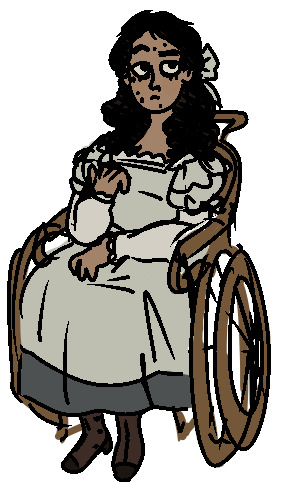
my girlie is back
#lise khokhlakova#hiiiiii#tbk#ingeborg racecar nikolajrostovs art tag which is the name of my actual art tag now
19 notes
·
View notes
Text



some sketches made yesterday
#tbk#the brothers karamazov#alyosha karamazov#alexei karamazov#ivan karamazov#dmitri karamazov#lise khokhlakova#katerina ivanovna verkhovtseva#ilyusha#russian literature#ruslit#dostoyevski#rknchan art
116 notes
·
View notes
Text
i was wrong about tbk 1969 making mme khokhlakova katya's aunt (they were two different actresses but i didnt notice💀) however i still think it would be interesting if lise was katya's cousin. it could be a parallelism with grushenka-rakitin and it fits my aesthetic vision of them
1 note
·
View note
Text


oops. She's aromantic now
#lise khokhlakova#ingeborg racecar nikolajrostovs art tag which is the name of my actual art tag now
34 notes
·
View notes